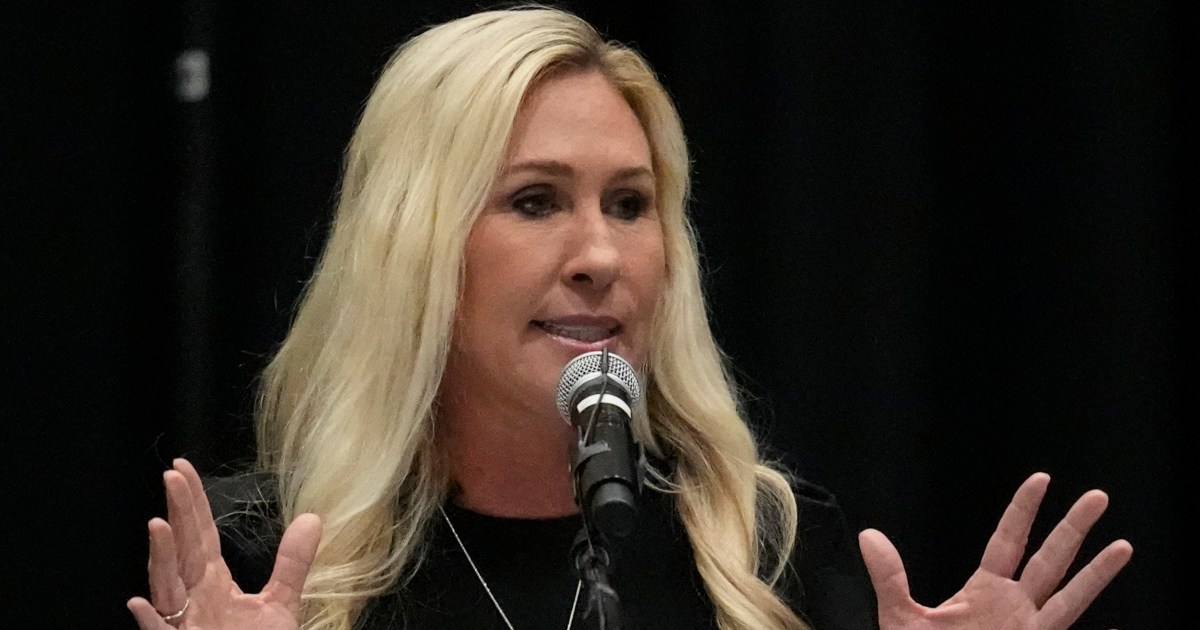Washington, DC – A bill in the United States Congress that aims to penalise the boycotting of countries friendly to the US is facing opposition from allies of President Donald Trump over free speech concerns, putting its passage in jeopardy.
According to Republican Congresswoman Marjorie Taylor Greene, a vote in the House of Representatives on the proposal, previously scheduled for Monday, has been cancelled.
Although Trump’s Republican Party has been leading legislative efforts to crack down on boycotts of Israel, over the past days, several conservatives close to the US president voiced opposition to the bill, dubbed the International Governmental Organization (IGO) Anti-Boycott Act.
“It is my job to defend American’s rights to buy or boycott whomever they choose without the government harshly fining them or imprisoning them,” Greene said in a social media post on Monday.
“But what I don’t understand is why we are voting on a bill on behalf of other countries and not the President’s executive orders that are FOR OUR COUNTRY???”
Charlie Kirk, a prominent right-wing activist and commentator, also said that the bill should not pass.
“In America you are allowed to hold differing views. You are allowed to disagree and protest,” Kirk wrote on X on Sunday. “We’ve allowed far too many people who hate America move here from abroad, but the right to speak freely is the birthright of all Americans.”
Steve Bannon, a former Trump adviser and influential right-wing media personality, backed the comments of Kirk and Greene, writing on the social media platform Gettr, “Fact check: True” and “Agreed” in response to their statements, respectively.
IGO Anti-Boycott Act
The proposed legislation was introduced by pro-Israel hawks in the US Congress, Republican Mike Lawler and Democrat Josh Gottheimer, in January, and it has been co-sponsored by 22 other lawmakers from both major parties.
The bill would expand a 2018 law that bans coercive boycotts imposed by foreign governments to include international governmental organisations (IGOs).
The original legislation prohibits boycotting a country friendly to the US based on an “agreement with, a requirement of, or a request from or on behalf” of another nation. It imposes penalties of up to $1m and 20 years in prison for violations.
Expanding the legislation to include IGOs risks penalising individuals and companies in the US that boycott firms listed by the United Nations as doing business in illegal Israeli settlements in the occupied West Bank.
While the bill itself does not explicitly mention Israel, its drafters have said that it targets the UN and the Boycott, Divestment and Sanctions (BDS) Movement, which calls for economic pressure on the Israeli government to end its abuses against Palestinians.
“This change targets harmful and inherently anti-Semitic BDS efforts at IGOs, such as the UN, by extending protections already in place for boycotts instigated by foreign countries,” Lawler’s office said in January.
States and the federal government have been passing anti-BDS laws for years, raising the alarm about the violation of free speech rights, which are guaranteed by the First Amendment of the US Constitution.
Numerous legal cases have challenged these laws, and some judges have ruled that they are unconstitutional, while others have upheld them.
Rights groups and Palestinian rights advocates have argued that anti-boycott laws aim to shut down the debate about Israel and criminalise peaceful resistance against its violations of international law.
Anti-BDS crackdown
Over the years, leading UN agencies and rights groups, including Human Rights Watch and Amnesty International, have accused Israel of war crimes and crimes against humanity, including imposing apartheid on Palestinians.
But supporters of anti-BDS laws say the measures are designed to combat discrimination against Israel and regulate trade, not speech.
Such laws have mainly faced opposition from progressive Democrats, but the IGO Anti-Boycott Act has generated anger from right-wing politicians, too.
“Americans have the right to boycott, and penalizing this risks free speech. I reject and vehemently condemn antisemitism but I cannot violate the first amendment,” Congresswoman Anna Paulina Luna, a Florida Republican, wrote on X.
I agree with @RepMTG .
I’ll be voting No on this bill as well. https://t.co/YOPga59Xyc
The right-wing rejection of the Lawler-Gottheimer bill comes as the Trump administration continues with its push to target criticism of and protests against Israel, especially on college campuses.
Since Trump took office, the US government has revoked the visas of hundreds of students for activism against Israel’s war on Gaza.
Several students, including legal permanent residents, have been jailed over allegations of anti-Semitism and “spreading Hamas propaganda”.
Rumeysa Ozturk, a Turkish graduate student at Tufts University, has been detained since March, and the only known allegation against her is co-authoring an op-ed calling on her college to honour the student senate’s call for divesting from Israeli companies.
Source: Aljazeera

Leave a Reply